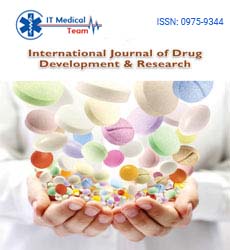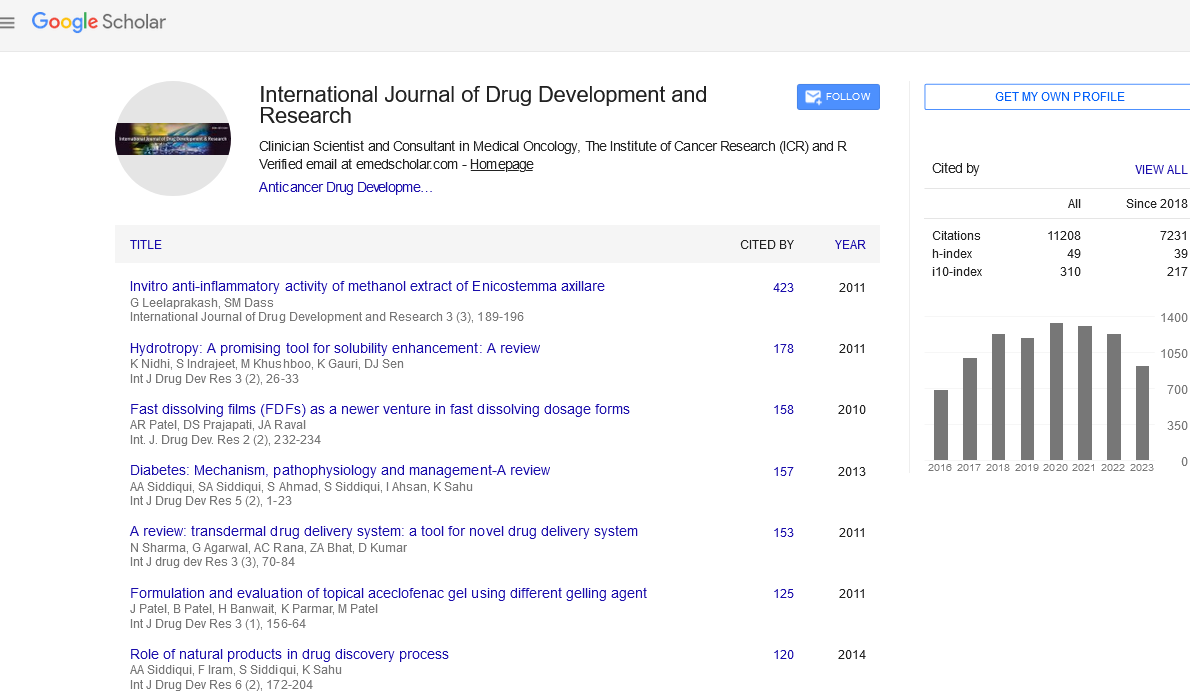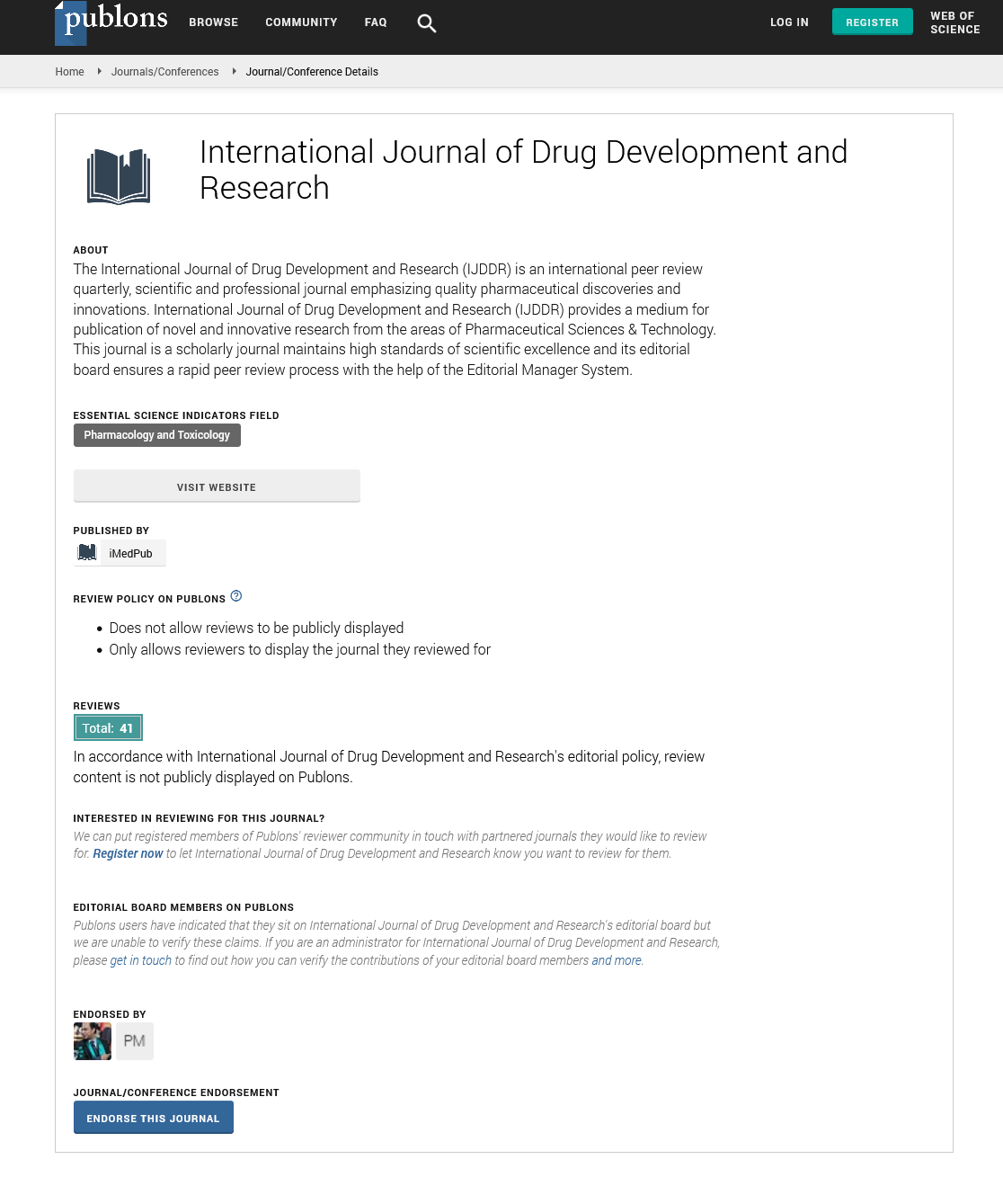Perspective - (2024) Volume 16, Issue 5
Potential of Psychedelics in Mental Health Treatment: A New Era of Therapeutics
Hamiaw Msahaeu*
Department of Pharmacy, University of Patra, Patra, Greece
*Correspondence:
Hamiaw Msahaeu, Department of Pharmacy, University of Patra, Patra,
Greece,
Email:
Received: 02-Sep-2024, Manuscript No. IJDDR-24-15198;
Editor assigned: 04-Sep-2024, Pre QC No. IJDDR-24-15198 (PQ);
Reviewed: 27-Sep-2024, QC No. IJDDR-24-15198;
Revised: 10-Oct-2024, Manuscript No. IJDDR-24-15198 (R);
Published:
17-Oct-2024
Introduction
The use of psychedelics in mental health treatment is no
longer confined to the realm of fringe science or counterculture.
Instead, it is gaining credibility within mainstream medicine as a
potentially transformative approach to treating a range of
mental health conditions. Once stigmatized and restricted,
substances such as psilocybin, MDMA, and ayahuasca are now
being rigorously studied for their therapeutic potential. This
article explores the burgeoning field of psychedelic therapy,
examining the scientific basis for their use, key research findings,
and the future outlook for these treatments.
Description
The resurgence of psychedelic research
The resurgence of interest in psychedelics can be traced back
to the early 2000’s when researchers began to revisit these
substances with a new perspective, unclouded by the
controversies of the 1960’s and 1970’s. Advances in
neuroimaging and a better understanding of brain function have
provided new insights into how psychedelics affect the brain,
leading to a revival of clinical studies.
Historically, psychedelics were seen primarily through a
recreational or spiritual lens. However, modern research is
uncovering their potential to treat various mental health
disorders by altering consciousness in ways that may facilitate
therapeutic breakthroughs.
Key psychedelics and their therapeutic potential
Psilocybin: Psilocybin, the psychoactive compound found in
certain mushrooms, is at the forefront of psychedelic research.
Clinical studies have shown that psilocybin may have significant
therapeutic benefits for individuals with depression, anxiety, and
addiction.
Depression: A landmark study published in nature medicine
found that psilocybin-assisted therapy led to significant
reductions in depressive symptoms in patients with Major
Depressive Disorder (MDD). Participants reported sustained
improvements in mood and cognitive flexibility, suggesting that
psilocybin may help patients break free from entrenched
patterns of negative thinking.
Addiction: Research also indicates that psilocybin could be
effective in treating substance use disorders. A study published
in Journal of Psychopharmacology found that psilocybin-assisted
therapy led to substantial reductions in alcohol consumption
among individuals with alcohol use disorder. The therapy
appears to facilitate profound personal insights and behavioral
changes, contributing to improved treatment outcomes.
MDMA: MDMA (3,4-methylenedioxy-methamphetamine),
commonly known as ecstasy, has garnered attention for its
potential to treat post-traumatic stress disorder (PTSD). Unlike
traditional antidepressants, MDMA promotes emotional
openness and reduces fear responses, which may help patients
process traumatic memories more effectively.
PTSD: Clinical trials led by the Multidisciplinary Association for
Psychedelic Studies (MAPS) have demonstrated that MDMA-assisted
psychotherapy can significantly reduce PTSD symptoms.
Participants who received MDMA showed remarkable
improvements in their ability to confront and integrate traumatic
experiences. The FDA has granted breakthrough therapy
designation to MDMA for PTSD, expediting its development and
approval process.
Ayahuasca: Ayahuasca, a traditional Amazonian brew
containing the psychedelic compound DMT (dimethyltryptamine),
has been used for centuries in spiritual and therapeutic contexts.
Modern research is beginning to explore its potential for treating a
variety of mental health conditions.
Depression and anxiety: Preliminary studies suggest that
ayahuasca may be effective in alleviating symptoms of
depression and anxiety. Research published in Psychological
Medicine found that participants who underwent ayahuasca
ceremonies reported significant improvements in mood and
emotional well-being. The unique combination of psychoactive
effects and ritualistic context may contribute to its therapeutic
benefits.
Mechanisms of action
Understanding how psychedelics work is crucial to appreciating
their therapeutic potential. Psychedelics primarily interact with
the brain’s serotonin system, particularly the 5-HT2A receptor.
This interaction leads to altered neural connectivity and changes
in brain network activity.
Altered brain connectivity: Neuroimaging studies have shown
that psychedelics can increase connectivity between different
brain regions, facilitating more fluid and dynamic patterns of
brain activity. This effect may allow individuals to access novel
perspectives and insights, contributing to the therapeutic
experience.
Neuroplasticity: Psychedelics may also promote neuroplasticity,
the brain's ability to reorganize and form new connections. This
effect could be beneficial for mental health conditions
characterized by rigid thought patterns or emotional responses.
By fostering a more adaptable brain, psychedelics may help
patients overcome maladaptive behaviors and thought
processes.
Current research and clinical evidence
Depression and anxiety: Recent clinical trials have provided
robust evidence supporting the use of psychedelics in treating
depression and anxiety. For example, a study published in JAMA
Psychiatry found that psilocybin-assisted therapy led to
significant reductions in depressive symptoms and
improvements in quality of life. The therapy appeared to
produce lasting effects, with participants experiencing sustained
improvements in mood and well-being.
PTSD and trauma: MDMA-assisted therapy has shown particular
promise in treating PTSD. Research published in The Lancet
Psychiatry demonstrated that MDMA-assisted psychotherapy
resulted in substantial reductions in PTSD symptoms, with many
participants achieving full remission. The therapy’s ability to facilitate
emotional processing and enhance therapeutic engagement makes
it a promising option for individuals with trauma related disorders.
Substance use disorders: Psychedelics are also being
investigated for their potential in treating substance use disorders.
Studies have shown that both psilocybin and ayahuasca may lead
to reductions in substance use and improvements in psychological
well-being. For example, a study published in drug and alcohol
dependence found that ayahuasca use was associated with
reduced alcohol consumption and increased psychological health.
Challenges and considerations
Safety and adverse effects: While the therapeutic potential of
psychedelics is exciting, it is essential to consider safety and
adverse effects. Psychedelic experiences can be intense and
unpredictable, sometimes leading to challenging psychological
experiences. Ensuring patient safety requires careful screening,
preparation, and support during and after the therapeutic
sessions.
Legal and regulatory issues: The legal status of psychedelics
varies globally, with many substances still classified as controlled
drugs. This classification poses challenges for research and
clinical use. Efforts are underway to reclassify psychedelics and
establish frameworks for their medical use, but navigating
regulatory hurdles remains a significant challenge.
Integration into mainstream medicine: Integrating psychedelics
into mainstream medical practice will require overcoming several
barriers. These include training healthcare professionals, developing
standardized protocols, and addressing societal stigma. As research
progresses, it will be crucial to establish evidence-based guidelines
and ensure that psychedelic therapies are delivered safely and
effectively.
The future of psychedelic medicine
The future of psychedelic medicine holds immense promise,
with ongoing research likely to expand our understanding of
these substances and their therapeutic applications. Advances in
neuroimaging, genomics, and clinical trial design will continue to
shed light on the mechanisms and benefits of psychedelics.
As societal attitudes shift and regulatory frameworks evolve,
psychedelics may become a valuable component of mental
health treatment. The potential for personalized and targeted
therapies based on individual genetic and psychological profiles
adds another layer of optimism for the future of psychedelic
medicine.
Conclusion
The exploration of psychedelics in mental health treatment
represents a paradigm shift in psychiatry, offering new hope for
conditions that have long resisted conventional therapies. With
promising research outcomes and evolving therapeutic
approaches, psychedelics have the potential to revolutionize
mental health care. As science advances and societal
perceptions evolve, psychedelics could play a pivotal role in
providing innovative solutions for those struggling with mental
health challenges, marking a new era of therapeutic possibilities.
Citation: Msahaeu H (2024) Potential of Psychedelics in Mental Health Treatment: A New Era of Therapeutics. Int J Drug Dev Res Vol:16 No:5






